Thanksgiving, 26th November
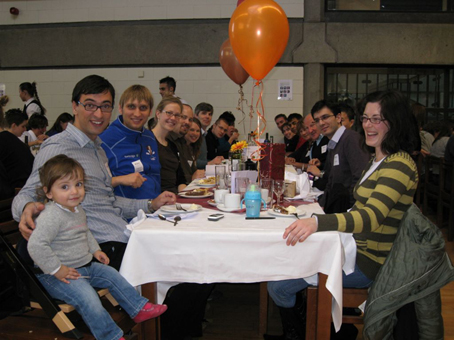 |
| Members of the Polymer Fluids Group at the Thanksgiving meal |
Members of the Polymer Fluids Group, led by Ben and his wife Amanda, attended the university's Thanksgiving lunch, held at the University Centre.
Ben Taylor on Radio 4, 19th November
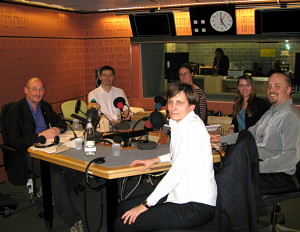 |
| Ben Taylor (far right) at the BBC Radio 4 Studio |
Polymer Fluids Group member Ben Taylor, recently helped present a project entitled "Algaetecture" on BBC Radio 4's The Material World. The programme aired live on the 19th November to a wide audience eager to learn about climate change and the role of algae in sustainable living. Ben and Algaetecture project colleague, Daniela Krug, talked a little bit about the project and how algae can be used to generate energy for a household. The programme also included related topics of CO2 emissions and the Copenhagen Climate Change Summit. A podcast of the programme can be found at http://www.bbc.co.uk/programmes/b006qyyb.
The Algaetecture project is a house design envisioned by University of Cambridge architecture students Daniela Krug, Karuga Koinange, and Chris Bowler and complemented by Ben's work with algae and photobioreactors. The symbiotic dwelling concept design incorporates photobioreactors into the building structure in an aesthetically pleasing manner, while simultaneously providing the home with energy from the algae's production of hydrogen, lipids, and biomass. The design won the international SASBE 2009 award, has been featured in BlueSci and Wired magazines and is available for viewing at www.algaetecture.com.
7th Int. Conference on Enhanced, Compact and Ultra-Compact Heat Exchangers:
Science, Engineering and Technology
Heredia, Costa Rica, 13th to 18th September
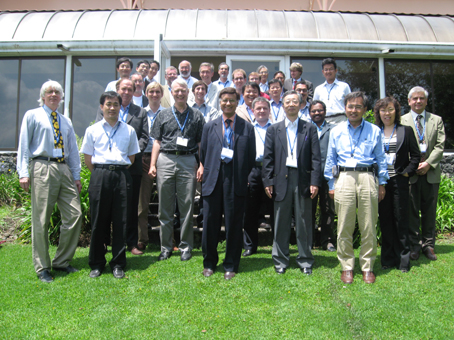 |
| Delegates at the conference |
The 7th Int. Conference on Enhanced, Compact and Ultra-Compact Heat Exchangers was held in The focus of the conference was on single and multiphase heat transfer in compact and space critical heat exchange devices. Topics ranged from fundamental studies, e.g. investigations on the thermal-hydraulic performance of nanofluids, and heat transfer enhancement studies such as the introduction of vortex generators in air flow heat exchangers, to specialised applications such as in aeronautics or Joule-Thomson micro-refrigerators.
The small number of participants and the format of having only one session at a time enabled lively and fruitful discussions after each talk which continued even into coffee or lunch breaks. Apart from experts on compact heat exchange, also a small number of participants working on microreactor technology or other related areas were present.
Christian Hornung from the Polymer Fluids Group represented the Department of Chemical Engineering and Biotechnology, Cambridge by giving a talk in the 'Single Phase Heat Exchanger Development & Application' session which was entitled 'Application of plastic microcapillary films (MCFs) as heat exchangers in low-cost solar energy collectors'.
8th World Congress of Chemical Engineering (WCCE8)
Montréal, Canada, 23rd to 27th August
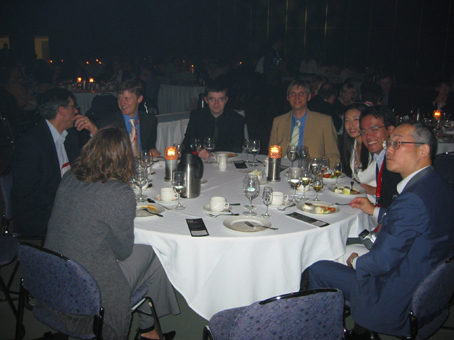 |
| Alasdair and Christian (centre) at the conference dinner |
The conference was the largest of its kind in the world. The session topics covered classical subjects such as 'Process Design', 'Separation Science', 'Particle Technology' or 'Chemical Engineering Education' as well as newer fields for chemical engineers especially in the biotechnology sector.
In general there was a strong emphasis on bio- and energy-related topics, which was reflected in numerous sessions such as 'Bioenergy and Green Engineering', 'Biomaterials', 'Bioproducts, Bioreactors and Bioprocesses', 'Biorefinery/Biomass Transformation', 'Biotechnology', 'Fuel Cells and Hydrogen Production' or 'Sustainability in Chemical Engineering'. Many plenary sessions also dealt with these subjects, e.g. the talks from Moniz, E. J. (Harvard), Lewin G. (Shell), Kreysa G. (DECHEMA) or Fogler H. S., to name but a few. The conference offered a huge number of oral presentations with sometimes more than 30 parallel sessions.
From Cambridge, Alasdair Campbell from the ‘Fluids and Environment Group’ and Christian Hornung from the ‘Polymer Fluids Group’ represented the Department of Chemical Engineering and Biotechnology by presenting two talks. Christian gave a presentation in the 'Micro Process Technology' session which was entitled ‘Residence time distributions of laminar flow in plastic multi-capillary microreactors’. The talk was well attended and received. Former members of the department also attended, including Richard West, now at MIT.
Non-Impact Printing
25th annual conference, Louville Kentucky, USA
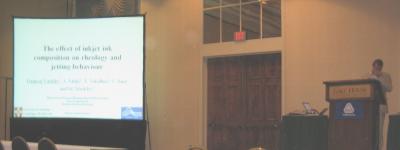 |
| Damien giving his presentation at the conference |
Dr. Damien Vadillo and Amit Mulji from the Polymer Fluids Group attended the Society for Imaging Science and Technology's Non-Impact Printing 25th annual conference, which was held in the American heartland of Louisville, Kentucky. Damien gave a presentation titled "The effect of inkjet ink composition on rheology and jetting behaviour", which outlined the work done in the group to some of the worlds leading researchers and industrial partners in the printing field. Amit also attended numerous short courses in order to increase his knowledge of this fast moving and multi-disiplinary field.
The conference provided a valuable opportunity discuss the work done in the department with a variety of individuals and some promising collaborations are in the pipeline. Overall the conference was a sucess with one of the highest number of attendees and presentations in its long and distinguised history. The PFG group is looking forward to next years conference in Austin, Texas!
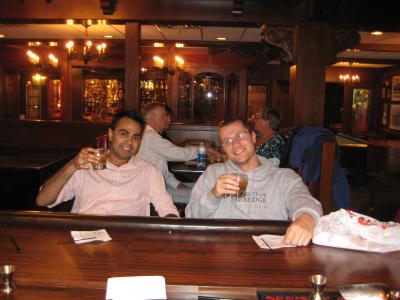 |
| Damien and Amit relaxing at the conference |
AERC 2009
15th - 17th April Cardif
Members of the Polymer Fluids Group attended AREC 2009, the 5th Annual European Rheology Conference, held in Cardif. The presentations given by the group included:
- The processing of semi-transparent polystyrene blends filled with cross-linked polystyrene beads, Dr Tim Lord.
- The quantification of viscoelasticityfor low viscosity ink jet fluids containing polymer and particle interactions, Dr Damien Vadillo.
- Matching the onset of flow-induced crystallisation for a high density polyethylene melt in complex geometries with numerical calculations of specific work, Dr Lino Scelsi.
Tim also chaired the "Blends, copolymers and nanocomposites" session.
Professor Jae Chun Hyun visits,
14th April 2009
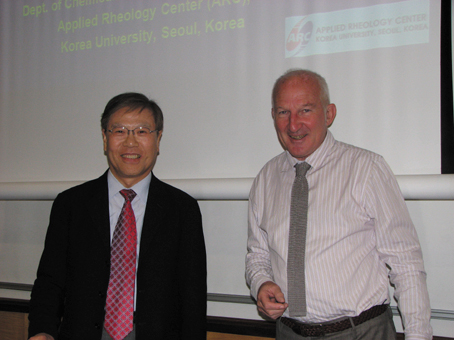 |
Photo: Professor Hyun with Professor Mackley before his lecture.
|
Professor Jae Chun Hyun of the Department of Chemical and Biological Engineering, Korea University, Seoul, Korea, visited the Polymer Fluids group. He gave an interesting presentation on "The role of Chemical Engineers and Chemical Engineering in the understanding of Global Macroeconomics".
Malcolm's Asia Lecture Tour
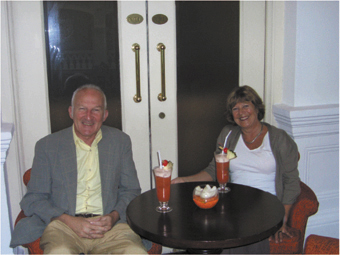 |
Photo: Malcolm and Margaret relaxing at Raffles cocktail bar, Singapore |
Malcolm has returned from a four week Asia lecture tour where he met up with a number of past group members.
Ashish Lele hosted his and Margaret's visit to Pune, India. Ashish now heads a Complex Fluids Group at the National Chemical Laboratory, (NCL) Pune and it was a pleasure to see how well he is doing in spite of not yet obtaining an MPR he ordered from Eland a long time ago.
Next stop was Singapore where Malcolm met up with current PhD student Sina Bonyadi's previous supervisor, Professor Neal Chung. Professor Chung has a group of thirty people working on porous membranes at the National University of Singapore (NUS). During the stopover at Singapore, David Hassell came down by express coach from Malaysia, to spend a day discussing research papers that are in the pipeline. It was great to see David and hear his generally positive view of being an academic in Malaysia.
The beautiful city of Melbourne captured the hearts of both Malcolm and Margaret and there were visits and lectures at Monash, Royal Melbourne Institute of Technology (RMIT) and Melbourne Universities. Kris Coventry kindly accommodated us both at his 100 year old house in the agreeable Brunswick area of Melbourne and also at his parents� country retreat at Metcalfe an hours drive north of the city. At Metcalfe we saw lots of kangaroos and also the "Christian Hornung posts" that he had helped put in on an earlier visit to Metcalfe. Kris is now working as a 'real chemical engineer' in a 'real polyethylene plant' just outside Melbourne and a visit to Qenos was both memorable and very impressive.
The final stopping point was Hong Kong where Ping Gao hosted a remarkable few days of luxury. She organised the visit, which included some wonderful gastronomic experiences. Ping's research is in a very creative phase and it was great to hear about work on fuel cells, carbon nanotubes and liquid crystal polymers. During the stay Malcolm managed to find a Saturday crewing job on an Etchells sailing from the Royal Hong Kong Yacht Club. All very exciting and a result of 2nd out of 20, entries was the icing on the cake.
Overall a fantastic adventure. Science in Asia is at a level that easily matches Europe and the fast emerging economies of India and China provide an backdrop of optimism and forward thinking in the whole of Asia.
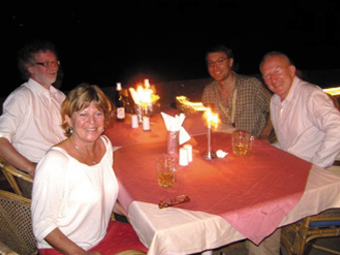 |
Photo: Malcolm, Margaret, Lino and Gerrit Peters (Eindhoven University) having a good time at the Prainha Beach Hotel Goa. |
Return to main news page

